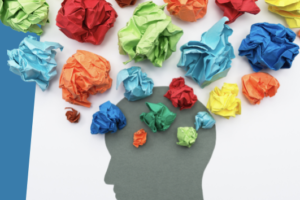This article was originally published in Never Too Late (PCOA News). View the original article here.
Progressive loss of vision is a common concern for older adults. Currently, about 40 percent of people aged 70 years or older are affected by vision loss, and 23 percent of older adults have both vision and hearing loss. In fact, visual impairment is the third leading cause of disability among older adults, and has significant implications for a person’s quality of life and independence. But do problems with vision also impact cognitive functioning as we get older? The answer to that question is not quite so clear. While researchers have demonstrated that age-related hearing loss increases a person’s risk for cognitive problems, the relationship between visual impairment and cognitive aging remains a little fuzzy.
Several recent large-scale studies have reported a connection between vision loss and cognition. These studies suggest that increasing visual impairment puts older adults at risk for developing cognitive impairment, faster cognitive decline over time, and a higher risk for the onset of dementia. For example, among 1,200 participants in the Baltimore Longitudinal Study of Aging, those with poor visual acuity or depth perception scored worse on tests of memory and language abilities. People with poor contrast sensitivity, that is, the ability to distinguish an object from a background, had difficulty on memory, language, attention, and visuospatial tasks. Other studies have suggested that fading eyesight also increases the risk for developing dementia, although not all studies find a similar increase in risk.
Progressive loss of vision is a common concern for older adults. Currently, about 40 percent of people aged 70 years or older are affected by vision loss, and 23 percent of older adults have both vision and hearing loss. In fact, visual impairment is the third leading cause of disability among older adults, and has significant implications for a person’s quality of life and independence. But do problems with vision also impact cognitive functioning as we get older? The answer to that question is not quite so clear. While researchers have demonstrated that age-related hearing loss increases a person’s risk for cognitive problems, the relationship between visual impairment and cognitive aging remains a little fuzzy.
Several recent large-scale studies have reported a connection between vision loss and cognition. These studies suggest that increasing visual impairment puts older adults at risk for developing cognitive impairment, faster cognitive decline over time, and a higher risk for the onset of dementia. For example, among 1,200 participants in the Baltimore Longitudinal Study of Aging, those with poor visual acuity or depth perception scored worse on tests of memory and language abilities. People with poor contrast sensitivity, that is, the ability to distinguish an object from a background, had difficulty on memory, language, attention, and visuospatial tasks. Other studies have suggested that fading eyesight also increases the risk for developing dementia, although not all studies find a similar increase in risk.
What about the combination of vision loss coupled with hearing loss? A recent The potential relationship between longitudinal study in 2021 addressed this question among 7,500 people, ages 65 and older, in the U.S. National Health and Aging Trends Study. They found that those individuals with declining eyesight and hearing loss were 50 percent more likely to be diagnosed with dementia over seven years compared to people without vision and hearing loss.
These are pretty scary statistics, particularly given how common it is for vision and/or hearing to decline with age. However, there are a couple of important points to consider when interpreting these studies that makes the connection between sensory loss and cognitive impairment not quite so straightforward.
First, importantly, people with failing eyesight have a lot more difficulty taking cognitive tests. Many cognitive tests require intact vision – looking at pictures, reading passages, responding to prompts on a computer screen, and so on. Even if someone isn’t experiencing dementia or cognitive problems of any sort, they’re still more likely to perform worse on clinical tests if their vision is poor. Scientists really don’t yet have a way of accounting for this difference in ‘test difficulty’ due to vision loss.
Secondly, there’s an important question about which comes first – vision loss or cognitive impairment? Some studies suggest that declines in visual ability precedes the onset of cognitive changes, suggesting that the visual loss is causing cognitive problems. But it’s equally possible that cognitive problems lead to more difficulty with vision. Vision is visual health and brain health
Alternatively, it could be that both vision and cognitive impairment occur together, simply because the aging brain is changing in ways that affect perceptual abilities and cognitive abilities similarly. One isn’t causing the other at all, they’re just changing hand in hand with increasing age.
Figuring out ‘which comes first’ is very important. Some researchers have interpreted these findings to suggest that preserving or restoring people’s vision can reverse the risk for dementia and help older adults maintain their cognitive abilities. At this point, we simply don’t know whether visual loss leads to cognitive decline, or whether it’s the other way around. It’s still a promising line of research, however. At least one research group has reported that people who had surgery to remove cataracts were 30 percent less likely to be diagnosed with dementia than those whose cataracts when untreated.
Regardless of whether vision loss contributes directly to cognitive impairment, it’s still a critically important concern for many older adults. Our vision, hearing, touch, and sense of smell are our windows on the world. Any loss of these precious sensory functions can lead to decreases in the quality of our lives, our enjoyment of activities, our social interactions, and possibly, our cognitive abilities. For all these reasons, early detection and treatment of sensory loss is critically important.
If you’d like to hear more about our studies, or if you’d be interested in participating, send us an email at [email protected]. We’ll tell you about some great opportunities to get involved. I’ll look forward to hearing from you!







